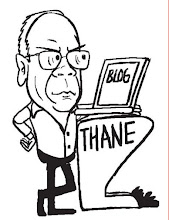A post on the Facebook this morning has set me thinking about the media's role in the Ayodhya issue.
The post they simply said the person was "convinced that the only people interested in tomorrow's Ayodhya verdict is the media.... Just like vultures are the only ones interested in dead bodies! Everybody else is keen to bury and move on!"
That imagery of the media as a vulture is quite appealing.
What makes the notion interesting is that he is not a mere reader, a conscious citizen or a thinking person but apparently involved in Public Relations, a business which used media extensively to mould public opinion. While those who buy newspapers or see television news channels are consumers, this person is a user of the media - that is an interpretation stemming from the role and function of PR. He ought, therefore, be quite in tune with the media.
After much mulling, and replaying things that I saw and read over the past few decades on the issue of Ayodhya, I think the view is bang on target. The media, it seemed then and it does now, just wanted to keep the story alive. And if that sustained the communal strife, so be it - more grist to the mill. One did not have to go and look for a story to tell; they just developed, fuelled by the media itself.
I too have reported communal strife, the one especially in Ahmedabad in 1985 and then the readers demanded that going by convention, no reportage of the events there ought to be written in a manner as to cause a reaction elsewhere. There was a clear embargo on identifying communities, if a person was injured or dead, the name was not to be mentioned. It was set that a communal incident should be reported with restraint. If you ask me, rightly too. We were told that the best reference was "a communal incident" and a temple or a mosque had to referred to as only a "place of worship". Sensible.
The early 1990s riots in Mumbai put an end to that restraint. The communities were freely mentioned, the death tolls helped identified the scores and if you please, the media did not emphasise that soon after the structure was demolished in Ayodhya, the anger of the Muslims was directed at the state or its visible instruments - from the police to the bus stops. Even the Srikirshna Commission report is unable to point out at which point the first phase of riots - remember, they were two, the second being after the or due to the killings in Jogeswari slums - became communal.
About that Commission's report - more some time later.
Journalists at that time, either because they felt seriously upset because at one point the Muslims became clear targets of the majority Hindus, that all stories had quotes from one community and not another, the ignored getting space only when something provocative was said by that section. Of course, hardly anything non-provocative was ever said by any since those days.
Everything was seen from the prism of the communal riots ever since, be it elections or be it policies. For much good has been done in Gujarat in the past decade but even pro-people issues well handled get a short shrift because the policies stem from Narendra Modi. There is this marked refusal to separate the two - the assumed, presumed, alleged or yet to be proven crimes of Modi and the public policies and efficiencies brought into the delivery mechanisms. The media which made much of the lathis carries by RSS workers at their shakas were seen as instruments to bully others but when Lalu Yadav took one, and said, come on, I'll deal them a blow, it was carried with pictures. Not necessarily because of his buffoonery but it was a bias.
At no point am I to be assumed to be a votary of HIndutva politics and their belligerence but the reporting we saw then was not what made for ideal, neutral reportage of a sensitive issue. Such neutral reporting was seen as sissy stuff by spineless or gutless journalists. I was damned by my colleagues who showed extraordinary interesting in reporting on the communal issue as one of the two, spineless or gutless. Or maybe both. I only smiled then and do so now.
And that far too frank a reportage and evident biases have harmed the country a lot more than one could imagine.

No comments:
Post a Comment